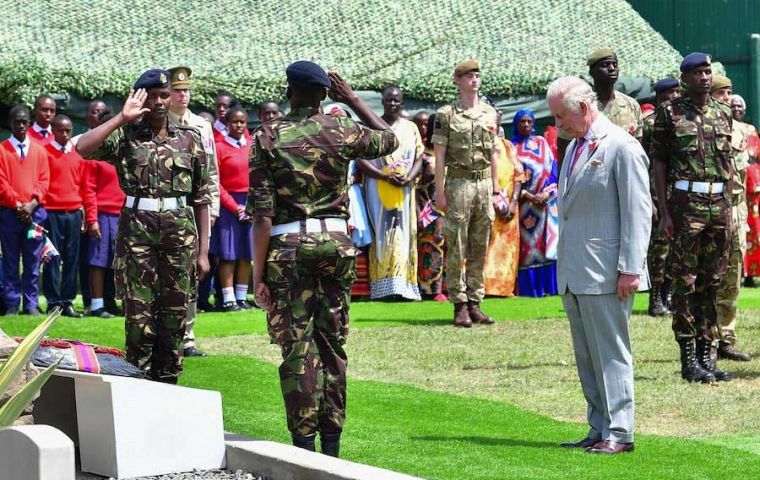MercoPress. South Atlantic News Agency
King Charles in Kenya addressed British colonial past and abuses
 Charles said that “the wrongdoings of the past are a cause of the greatest sorrow and the deepest regret,” but he stopped short of making a full apology for the abuses (Pic AP)
Charles said that “the wrongdoings of the past are a cause of the greatest sorrow and the deepest regret,” but he stopped short of making a full apology for the abuses (Pic AP) King Charles is in Kenya in his first foreign visit as a monarch to a Commonwealth nation where he addressed the colonial past of British rule in East Africa, and abuses committed by colonial forces, especially in the 1950's during the Kenyan struggle for independence.
Charles said in a speech that “the wrongdoings of the past are a cause of the greatest sorrow and the deepest regret,” but he stopped short of making a full apology for the abuses.
“There were abhorrent and unjustifiable acts of violence committed against Kenyans as they waged... a painful struggle for independence and sovereignty – and for that, there can be no excuse,” he said.
In response, Kenya's President William Ruto praised the King's courage for addressing such “uncomfortable truths”.
The Kenyan head of state told the King that colonial rule had been “brutal and atrocious to African people” and that “much remains to be done in order to achieve full reparations”.
This year, Kenya celebrates the 60th anniversary of its independence.
Charles was received by Kenyan President William Ruto in the capital, Nairobi.
Buckingham Palace said the visit is a reflection of the UK and Kenya's close cooperation on economic development, climate change and security.
Charles and his wife Camilla will tour a new national history museum and visit the site where Kenya's independence was declared in 1963.
He is also scheduled to visit Nairobi National Park and meet with environmental activist Wanjira Mathai.
“His Majesty will take time during the visit to deepen his understanding of the wrongs suffered in this period by the people of Kenya,” the palace said.
The British High Commission said Charles would also “meet veterans and give his blessing to efforts by the Commonwealth War Graves Commission to ensure Kenyans and Africans who supported British efforts in the World Wars are properly commemorated.”
The UK government has previously expressed regret over abuses committed during the colonial period, most notably during the 1952/1960 Mau Mau revolt in central Kenya. The Kenya Human Rights Commission (KHRC) estimated that 90,000 people were killed or maimed and 160,000 detained by colonial authorities during the uprising.
In 2013, London agreed to an out-of-court settlement of almost 20 million pounds over the military operations that put down the Mau Mau rebellion.
At last year's Commonwealth summit, Charles acknowledged the role of slavery in the British Empire's history.




Top Comments
Disclaimer & comment rulesCommenting for this story is now closed.
If you have a Facebook account, become a fan and comment on our Facebook Page!